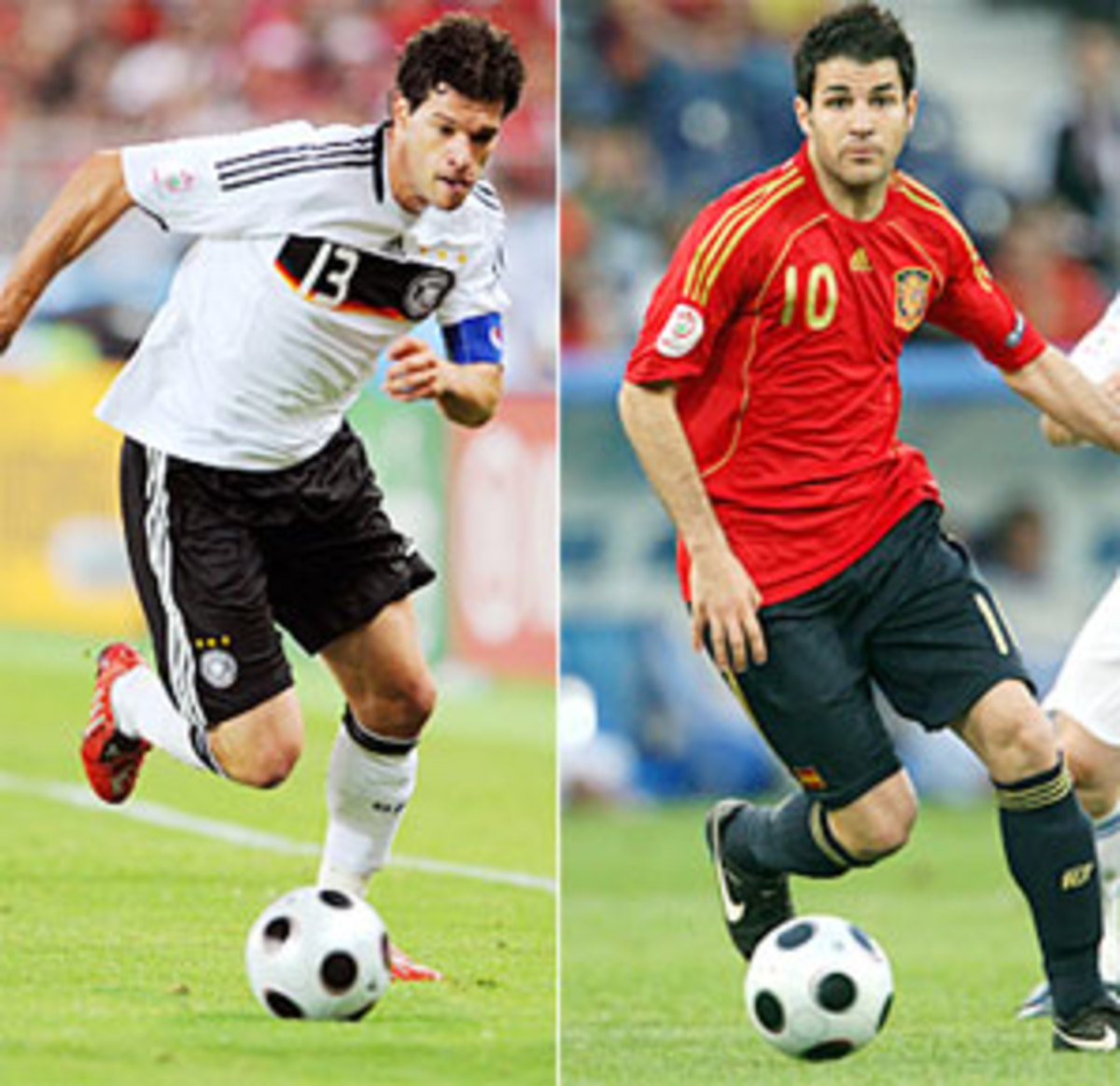Breaking down Germany vs. Spain
Let's count the reasons why Germany has no business beating Spain for the Euro 2008 championship on Sunday (ABC, 2:45 p.m. ET):
• Spain has been the undisputed best team in Euro 2008, winning every one of its games. (I consider the penalty-kick elimination of Italy a win, statisticians be damned). Germany lost convincingly to Croatia in the group stage and has had a schizophrenic tournament.
• German midfield star Michael Ballack was rendered invisible in the semifinals by one Brazilian-born defensive midfielder (Turkey's Mehmet Aurélio), and he'll be facing an even better Brazilian-born D-mid (Spain's Marcos Senna) on Sunday.
• Germany struggled mightily and needed a last-minute goal to win a 3-2 semifinal against a Turkish team that was missing its four best attacking players due to injuries or suspensions. For its part, Spain throttled a red-hot Russian side in the semis 3-0.
• Germany's borderline insane goalkeeper, Jens Lehmann, gave up not one, but two soft goals against Turkey, and Near-Post Jens' form at his ex-club Arsenal was so shaky that he lost his starting job to a goalkeeper (ManuelAlmunia) who couldn't even make this Spanish team. His counterpart in this game, Spain's Iker Casillas, has been marvelous in goal during Euro '08.
• Spain's due. La Furia Roja got over its "choker" past by ousting Italy in the quarterfinals, and now that the psychological barrier is gone, the Spaniards can finally maximize their talent advantage over the Germans and win Spain's second major trophy (after the 1964 European title).
• If dinged-up striker David Villa is declared healthy to play, Spain's three likely subs (Cesc Fàbregas, Xabi Alonso, Dani Güiza) are way better than Germany's (Marcell Jansen, Kevin Kuranyi, Tim Borowski). And even if Villa can't play, Spain can seamlessly insert Fàbregas into the lineup and switch to a 4-5-1 formation.
• Spain's back line has been amazing in the knockout rounds, shutting out Italy and Russia. Carles Puyol and Carlos Marchena clamped down on Luca Toni and Andrei Arshavin in the center, left-back Joan Capdevila hasn't taken anything off the table, and right-back Sergio Ramos has balanced attacking and defending far better in recent games.
• Spain has a greater number of creative sources on the attack. Midfielders Fàbregas, David Silva, Xavi and Andrés Iniesta spread out the worries more than Germany's trio of Ballack, Bastian Schweinsteiger and Lukas Podolski. (Swashbuckling outside backs Ramos and Philipp Lahm cancel each other out.) Advantage: Spain.
Bottom line: On paper it should be pretty easy to pick Spain in this game. And so, of course, I'm going with Germany. Why?
• Germany knows how to convert set-pieces. How many times have we seen the Germans be outplayed on the field, only to win the game on a ruthlessly converted set-piece goal? It happened again in the quarterfinals against Portugal, and this Spanish team reminds me a lot of its Iberian counterpart. Marchena and Puyol are not nearly as tall as Germany's Miroslav Klose, Schweinsteiger and Christoph Metzelder, and the goals that Spain has allowed in this tournament have come on balls in the air. Spain may outplay the Germans, but they will not out-set-piece them.
• Germany almost always regroups after a sub-par performance. We saw it in the group-stage when the Germans dispatched Austria after the loss to Croatia. This is where Ballack earns his stripes as a captain, rallying the troops when it counts. This is where the German defense eliminates the mistakes it made against Turkey.
• Podolski and Schweinsteiger understand winning-time -- and each other. Their combination plays to score goals against Portugal and Turkey were things of beauty, and you know they'll show up on Sunday ready to play.
So yes, there are more reasons Spain will win. But this is Germany, after all, and I feel like we've been through this before. Should be a great game, though.
Germany 2, Spain 1.






